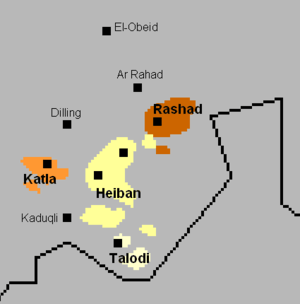Talodi–Heiban languages
| Talodi–Heiban | |
|---|---|
| Geographic distribution | Nuba Hills, Sudan |
| Linguistic classification |
|
| Subdivisions | |
| Glottolog |
None narr1279 (Talodi)[1] heib1242 (Heiban)[2] |
 | |
The Talodi–Heiban languages are a branch of the Niger–Congo family spoken in the Nuba Mountains of Sudan. The Talodi languages and Heiban languages are clearly distinct but relatively closely related.[3]
Classification
Talodi and Heiban had each constituted a group of the Kordofanian branch of Niger–Congo that was posited by Joseph Greenberg (1963); Talodi has also called Talodi–Masakin, and Heiban has also been called Koalib or Koalib–Moro. Roger Blench notes that the Talodi and Heiban families have the noun-class systems characteristic of the Atlantic–Congo core of Niger–Congo, but that the Katla languages (another putative branch of Kordofanian) have no trace of ever having had such a system, whereas the Kadu languages and some of the Rashad languages appear to have acquired noun classes as part of a Sprachbund, rather than having inherited them. He concludes that the Kordofanian languages do not form a genealogical group, but that Talodi–Heiban is core Niger–Congo, whereas Katla and Rashad form a peripheral branch (or perhaps branches) along the lines of Mande. The Kadu languages may be Nilo-Saharan.
| Talodi–Heiban |
| ||||||||||||||||||||||||||||||||||||||||||||||||||||||||||||
- † = extinct
Lafofa (Tegem), sometimes classified as a divergent Talodi language, has a different set of cognates with other Niger–Congo and has been placed in its own branch of Niger–Congo.
See also
Notes
- ↑ Hammarström, Harald; Forkel, Robert; Haspelmath, Martin; Bank, Sebastian, eds. (2016). "Talodi". Glottolog 2.7. Jena: Max Planck Institute for the Science of Human History.
- ↑ Hammarström, Harald; Forkel, Robert; Haspelmath, Martin; Bank, Sebastian, eds. (2016). "Heiban". Glottolog 2.7. Jena: Max Planck Institute for the Science of Human History.
- ↑ Gerrit Dimmendaal, 2008. "Language Ecology and Linguistic Diversity on the African Continent", Language and Linguistics Compass 2/5:842.
- Roger Blench. Unpublished. Kordofanian and Niger–Congo: new and revised lexical evidence.
- Roger Blench, 2011, Should Kordofanian be split up?, Nuba Hills Conference, Leiden